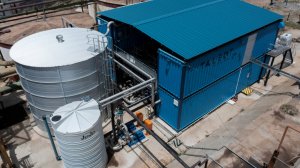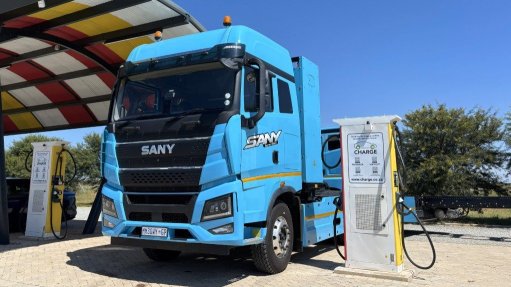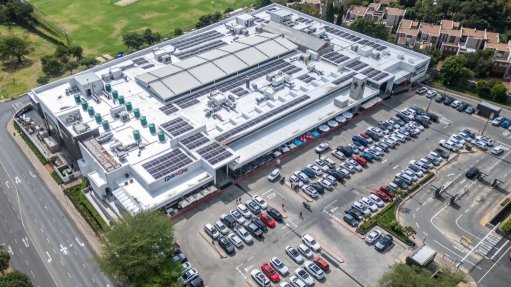Campaigns can help maximise water recovery – firm

Talbot CEO Carl Haycock discussing the water crisis ahead of this year’s National Water Week. Recording: Lumkile Nkomfe. Editing: Shadwyn Dickinson. Recorded 16-02-2024
In light of the recent surge of waterborne disease outbreaks, water shedding, supply disruptions and emerging water scarcity, water-solutions company Talbot positively embraces this year’s Water Week theme of ‘Water for All’.
This year’s National Water Week is scheduled to take place from March 20 to 26. The campaign is aimed at promoting awareness around the protection and conservation of the country’s water resources.
Talbot commends the apt nature of this year’s theme, as it echoes the constitutional imperative of affording everyone access to sufficient water.
The company maintains that it has a proven 35-year record of delivering sustainable water security solutions and strategies to industry across South Africa while promoting the awareness of water risk and scarcity.
Not only does Talbot focus on the pertinent water security challenges in the industrial sector, but it also holds seminars to educate its clients on water risk and the opportunities and challenges that this presents for enterprises in the private and public sectors.
Recently, the company voluntarily supported the efforts of the Hennops River Revival in Gauteng by performing water-quality tests in their laboratory. Talbot also sponsors and tests water samples taken weekly from the Msunduzi and Mgeni rivers in KwaZulu-Natal and from a number of locations along the eThekwini beachfront.
The sampling and testing of rivers and beaches has resulted in an increased public awareness around water-quality and the levels of pollution that our rivers and seas are subject to. In a number of instances, the water sampled in the rivers and beaches was unsafe for recreational purposes.
“Prior to this, I don’t think the public was generally aware of the poor quality of water that is discharged into the rivers and beaches, as a result of failing infrastructure and wastewater entering stormwater systems,” says Talbot CEO Carl Haycock.
Highlighting the importance of water, Haycock adds that the resource, aside from being needed for consumption and sanitation, is used at some point in virtually every consumer product, from food to clothing to smartphones. He, therefore, implores all sectors of society to understand and address how the water crisis affects them by identifying risks and associated mitigation.
Several of Talbot’s industrial and mining clients are already having to deal with the effects of water disruption. To mitigate this problem, the company is designing and building water-treatment and water recovery plants for clients and supplies them with the requisite water solutions to ensure their continued operations.
Talbot notes that, without these interventions, production at some of their clients’ mining and industrial operations would have had to shut down for a week or more in the recent past, resulting in significant production and subsequently revenue losses.
The company welcomes the increase in collaborative efforts between the public and private sectors to create awareness regarding water security risks, including water scarcity and pollution. Government and the private sector should use these challenges as an opportunity to mull over the viability of concessions for private companies to provide water for municipalities and outlying areas.
On a municipal level, it asserts that there are opportunities for collaboration between the two sectors, especially as it pertains to water recovery.
“I think water recovery in municipalities is actually easier than in industry. The only challenge is the mindset we have in that we don’t want to drink water recovered from wastewater, despite this being well-established practice. There are already several places in South Africa that recover water and return treated wastewater back into the system for reuse. There are also many countries elsewhere in the world that do exactly that,” notes Haycock.
He says mining operations are actively trying to engage with municipalities and water boards to support them by providing treated mine water into their water supply systems.
Everything Talbot does revolves around water sustainability, with the company having recently completed a number of mining projects aimed at treating mine water to a potable level for both drinking water and process water purposes.
In assessing the country’s investment potential amid the water crisis, Haycock asserts that water availability will be a key factor in determining the viability of investing in industrial expansion or greenfield projects or even new property developments.
He adds that investors would, therefore, require assurances that enough water would be available for their long-term needs; consequently, the current water infrastructure crisis is contributing to the erosion of investor confidence.
Haycock notes the rapid semi-migration of people has added pressure to already strained systems in some areas such as parts of the Western Cape and Gauteng. This puts additional pressure on water security. He concedes that the water supply challenges across the country have not yet been adequately resolved, resulting in gradual economic decline.
The company says a week-long water awareness initiative is not sufficient, as there is a constant need for awareness on the country’s water issues.
“If you look at the state of some of the rivers, they are diabolical in terms of levels of pollution, so I think that awareness needs to be driven consistently,” Haycock concludes.
Article Enquiry
Email Article
Save Article
Feedback
To advertise email advertising@creamermedia.co.za or click here
Press Office
Announcements
What's On
Subscribe to improve your user experience...
Option 1 (equivalent of R125 a month):
Receive a weekly copy of Creamer Media's Engineering News & Mining Weekly magazine
(print copy for those in South Africa and e-magazine for those outside of South Africa)
Receive daily email newsletters
Access to full search results
Access archive of magazine back copies
Access to Projects in Progress
Access to ONE Research Report of your choice in PDF format
Option 2 (equivalent of R375 a month):
All benefits from Option 1
PLUS
Access to Creamer Media's Research Channel Africa for ALL Research Reports, in PDF format, on various industrial and mining sectors
including Electricity; Water; Energy Transition; Hydrogen; Roads, Rail and Ports; Coal; Gold; Platinum; Battery Metals; etc.
Already a subscriber?
Forgotten your password?
Receive weekly copy of Creamer Media's Engineering News & Mining Weekly magazine (print copy for those in South Africa and e-magazine for those outside of South Africa)
➕
Recieve daily email newsletters
➕
Access to full search results
➕
Access archive of magazine back copies
➕
Access to Projects in Progress
➕
Access to ONE Research Report of your choice in PDF format
RESEARCH CHANNEL AFRICA
R4500 (equivalent of R375 a month)
SUBSCRIBEAll benefits from Option 1
➕
Access to Creamer Media's Research Channel Africa for ALL Research Reports on various industrial and mining sectors, in PDF format, including on:
Electricity
➕
Water
➕
Energy Transition
➕
Hydrogen
➕
Roads, Rail and Ports
➕
Coal
➕
Gold
➕
Platinum
➕
Battery Metals
➕
etc.
Receive all benefits from Option 1 or Option 2 delivered to numerous people at your company
➕
Multiple User names and Passwords for simultaneous log-ins
➕
Intranet integration access to all in your organisation



















